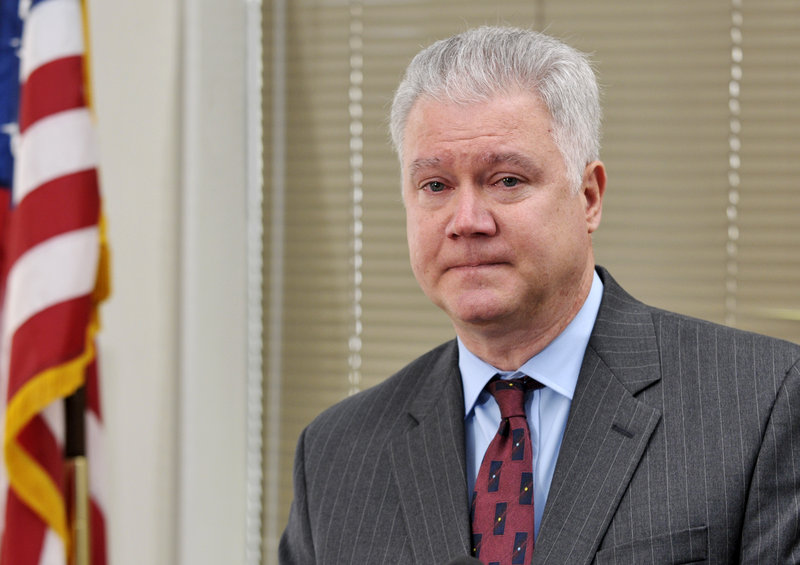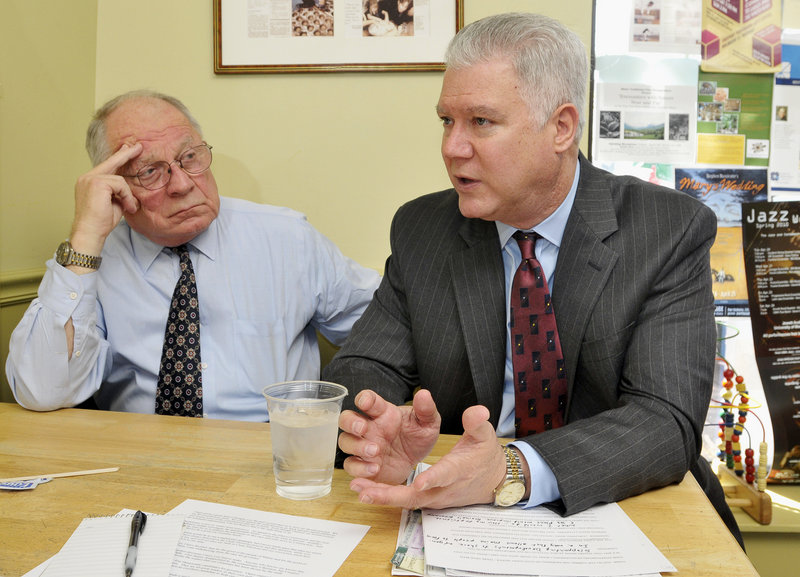BRUNSWICK – The field of Democratic candidates for governor shrank by one Monday, as John Richardson withdrew in response to a finding that his campaign workers didn’t follow the rules for public campaign financing when they gathered contributions.
Richardson, 52, was one of five candidates in the June 8 Democratic primary. He announced his decision Monday to reporters and campaign supporters, detailing why he quit the race and the events leading up to it.
“This is the hardest decision I ever had to make,” he said, his voice breaking with emotion. “Anyone who knows me knows that I do not run from a fight.”
Political experts suggested that the change in the field may make it easier for the remaining candidates to get their messages out.
“There’s one less voice out there now,” said Mark Brewer, a political scientist at the University of Maine. “It may be easier for the remaining candidates to get their message heard above the din.”
Richardson planned to run with campaign funding through Maine’s Clean Election Act.
Clean Election candidates had until April 1 to turn in at least 3,250 $5 contributions and supporting documentation, as well as proof that they had raised at least $40,000 in seed money. Richardson’s campaign filed with the Maine Commission on Governmental Ethics and Election Practices on April 1.
About two weeks ago, Richardson said, two of his roughly 200 volunteers told him that they may have made mistakes in the documentation. He said he immediately called the ethics commission to “self-report” the problems.
On Thursday, the commission’s executive director, Jonathan Wayne, sent Richardson a 13-page letter denying him Clean Election funds. The letter detailed problems with four contribution collectors, whose names were not released.
It read, in part, “because the (commission’s) staff has found that certain campaign workers falsely stated that they collected qualifying contributions, the staff is unable to accept any contributions claimed by those workers unless the contributors have independently confirmed to the commission staff that they made the contributions with their own personal funds.”
The seed money contributions were all found to be in order, according to the letter. But at least four people may have falsely claimed to have collected contributions. Of the 3,597 contributions submitted, the commission accepted 3,168.
“Every one of our circulators, every one of our volunteers, were given specific instructions either by me or senior staff as to how to collect contributions, and every one was told and expected to follow the letter of the law,” Richardson said.
APPEAL SEEN AS DISTRACTION
Richardson said the circulators “cut corners” on the documentation, and he acknow-ledged that he was accountable for whatever happened in his campaign.
He said that “in some cases, there may have been honest, stupid mistakes.
“In other cases, there may not have been,” he said.
In the letter, Wayne wrote that “because of the extent of the violations discovered, the commission staff is concerned that more qualifying contributions submitted by the campaign staff may not actually be valid.”
Richardson said Monday that he was sure his campaign could have validated the number of contributions needed to qualify for Clean Election funding.
But, he said, the appeal would have taken too long. With the primary just six weeks away, the appeal process would have limited his ability to campaign effectively, and it would have become a distraction to the entire race.
If he had succeeded, he said, the release of $400,000 in Clean Election funds so late in the campaign would “not be a good use of public funds.”
He said he didn’t want to run a privately financed campaign because he believes in the Clean Election system.
“Personal wealth or special interests have no place and should not dictate the outcome of an election,” he said.
Richardson, an attorney, said he hasn’t given much thought to what he will do next. “I never thought I would lose the race,” he said. “I always thought I’d have a job to do after June 8.”
CLEAN ELECTIONS BAR TOO HIGH?
Richardson’s name still will appear on the Democratic ballot June 8 because ballots have already been printed and distributed. The state may encourage communities to post notices that Richardson is no longer a candidate, said Secretary of State Matthew Dunlap. Votes for Richardson will not be counted.
Anthony Corrado, professor of government at Colby College, said the case highlights the high standards that are applied to the use of public campaign funding. Maine recently increased the requirements for public funding, he noted, and candidates who seek it find the process laborious.
“The question will be whether we had a bar that was set too low before, and now we have raised the bar, and whether or not it’s been raised too high,” said Corrado.
Jim Melcher, a political scientist at the University of Maine at Farmington, said he expects Richardson’s withdrawal to help Democratic candidates Steven Rowe, Pat McGowan and Elizabeth Mitchell — “the candidates who’ve been in elected office.”
Richardson was speaker of the Maine House and most recently was commissioner of the Department of Economic and Community Development. Presumably, he drew support because he has been working in the system, like the other three candidates, Melcher said.
Brewer, at UMaine, said that other candidates may drop out before the primary. Specifically, he said, privately funded candidates may decide they don’t have a shot and choose to stop spending money.
Gubernatorial candidates had various responses to Richardson’s withdrawal.
Rosa Scarcelli of Portland said the news was “stunning and unfortunate,” and called Richardson an “able competitor.
“However, the report today by the ethics commission raises many disturbing questions. It cannot be the last word,” Scarcelli said. “Maine people expect complete openness, transparency and accountability in (state) government, and we must not sweep this situation under the rug and just move on.”
Mitchell, of Vassalboro, said Maine voters “should be proud of the thorough work of the ethics commission. Clean Elections is about campaigning the right way and ensuring citizens have a voice in the process.”
Mitchell qualified for Clean Election funding, as did McGowan.
MILLS: MORE VOTES FOR MITCHELL
McGowan, a Hallowell resident, said Richardson “had put the best interests of the people of Maine as his first priority — just as all of the candidates in this race have done.
“It must have been a difficult decision for John to remove himself from this race,” McGowan said. “He was a good competitor in this primary, and he helped to further the discussion about how we could put Maine in the best position possible going forward.”
Rowe, of Portland, said the debate has been “richer for having John Richardson’s voice in it, particularly his ideas for creating good-paying jobs in Maine.”
Peter Mills of Skowhegan, the only Republican who is running with public funding, said the process is difficult and, at times, frightening.
“You put your political life in the hands of a number of volunteers,” he said. “If 99 percent of them are honest and well-meaning and one of them is not, it can really do you a lot of harm.”
Mills predicted that most of Richardson’s support would go to Mitchell.
He said Richardson’s base was public employee union members, such as police officers and firefighters.
Compared with McGowan, who has been out of elective office since the 1980s, and Rowe, who served eight years compared with Mitchell’s 24 years in the Legislature, “(she) has had more occasions to support those employee unions,” Mills said.
— The Associated Press and Ethan Wilensky-Lanford of the Kennebec Journal contributed to this report.
Staff Writer Matt Wickenheiser can be contacted at 791-6316 or at: mwickenheiser@pressherald.com
Send questions/comments to the editors.




Comments are no longer available on this story